Introduction
- Walmart expands its market to other countries.
- It values the contributions of every worker.
- Endeavors to uphold quality in its performance.
- Individual employees, teams, and the whole organization.
- It supports the virtues of sincerity, impartiality.
- Needs to reinforce its organizational culture.
- Globalization has resulted in Walmart’s market expansion (Schuetz, 2015).
Walmart is expanding its market to other countries and working hard to retain competitive advantage. It values the contributions of every worker for the success of its operations. Furthermore, Walmart endeavors to uphold quality in the performance of individual employees, teams, and the whole organization. With respect to sustaining ethics, it supports the virtues of sincerity, impartiality, and justice in decision-making (Schuetz, 2015). There is a need to reinforce the organizational culture in Walmart to uphold its success and sustainability. Globalization has resulted in Walmart’s market expansion endeavors.
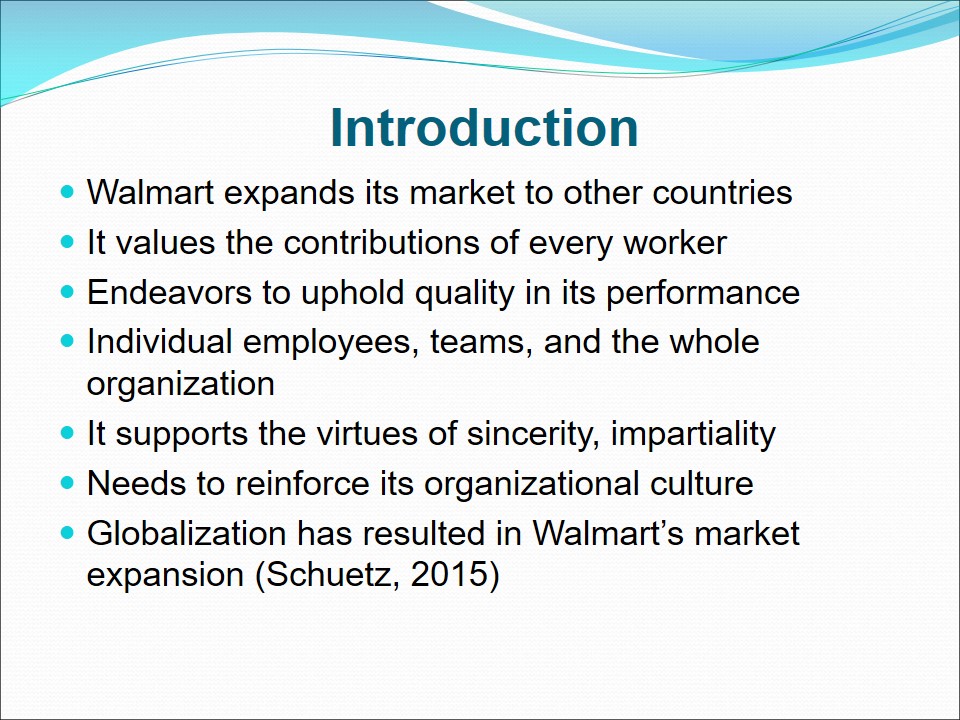
Market Expansion
- Attributable to globalization, Walmart replicates its supremacy.
- Has targeted market expansion on other nations.
- It strives to take the leading position.
- Walmart is enhancing its exposure to UK.
- The organization has strongly competitive grocery products.
- Expanding its operations in India and Brazil (Schuetz, 2015).
- Approach employed adjusted to become transnational plan.
Attributable to the influence of globalization, Walmart has long sought to replicate its supremacy outside the United States. It has targeted its market expansion on other nations where it strives to take the leading or second position. It is enhancing its exposure to the United Kingdom with its competitive grocery products (Schuetz, 2015). Walmart is also expanding its operations in India and Brazil, centering on the quickly growing global opportunities, and laboring to buttress its home base despite new rivalry from its competitors. The approach employed by Wal-Mart is being adjusted to become the transnational plan.
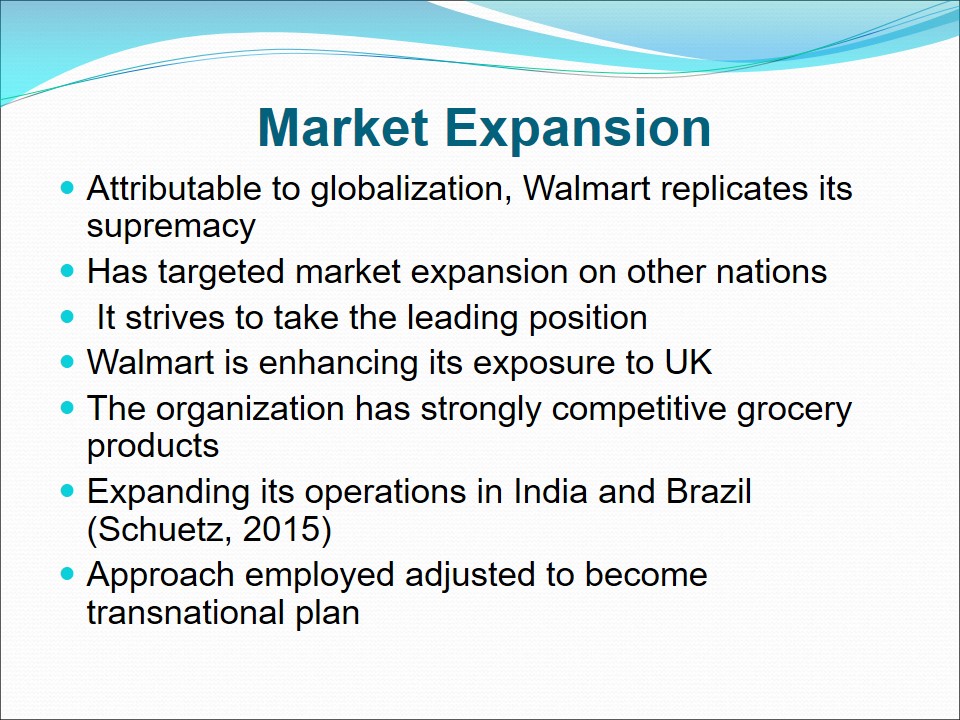
Vision, Mission, and Values
- Saving people money so they live better (Hunt, Watts, & Bryant, 2018).
- The mission statement enables address ethical concerns.
- Walmart is dedicated to undertake business professionally.
- Be best retailer in consumers and employees.
- Corporate social responsibility based on financial gains.
- The corporation has swayed customers and workers.
- Encompass striving for excellence, respect for individual.
The organization’s mission is “saving people money so they can live better” (Hunt et al., 2018). The mission statement enables Walmart to address ethical concerns as it is dedicated to carrying out business practices professionally. Walmart’s vision statement is “to be the best retailer in the hearts and minds of consumers and employees.” Through corporate social responsibility, the corporation has swayed the minds of its customers and workers based on financial gains. Walmart’s values encompass striving for excellence, respect for the individual, and service to customers.
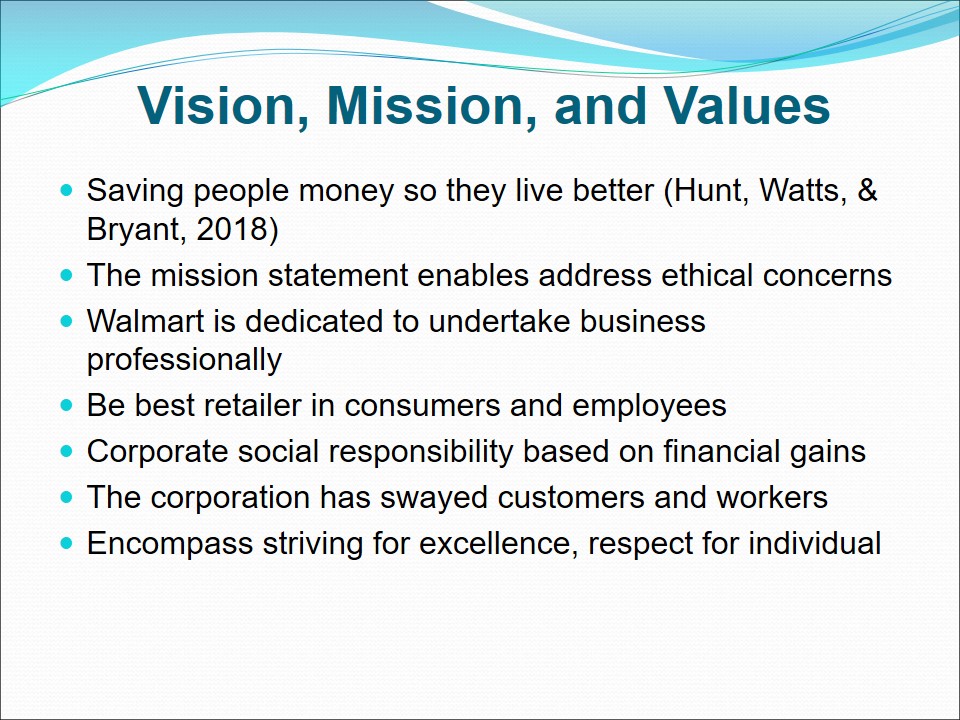
How Organization Values Drive the Culture
- Organizational values drive the culture of inclusivity.
- Hires and supports workers at all levels.
- They achieve results and back core values.
- They build teams that propagate similar values (Erhardt, Martin-Rios, & Heckscher, 2016).
- Leaders believe every stakeholder has significant voice.
- Crucial role in undertaking operations of corporation.
- Convinced that any associate may offer notion.
The organizational values drive the culture of inclusivity. The corporation hires and supports workers at all levels where they achieve results and back core values. In such an approach, they build teams that propagate similar values hence driving the culture (Erhardt et al., 2016). Leaders in the organization believe that every stakeholder has a significant voice and has a crucial role to play in undertaking the operations of the corporation. They are convinced that any associate may offer the next big notion that will push Walmart ahead of its competitors and facilitate sustainability.
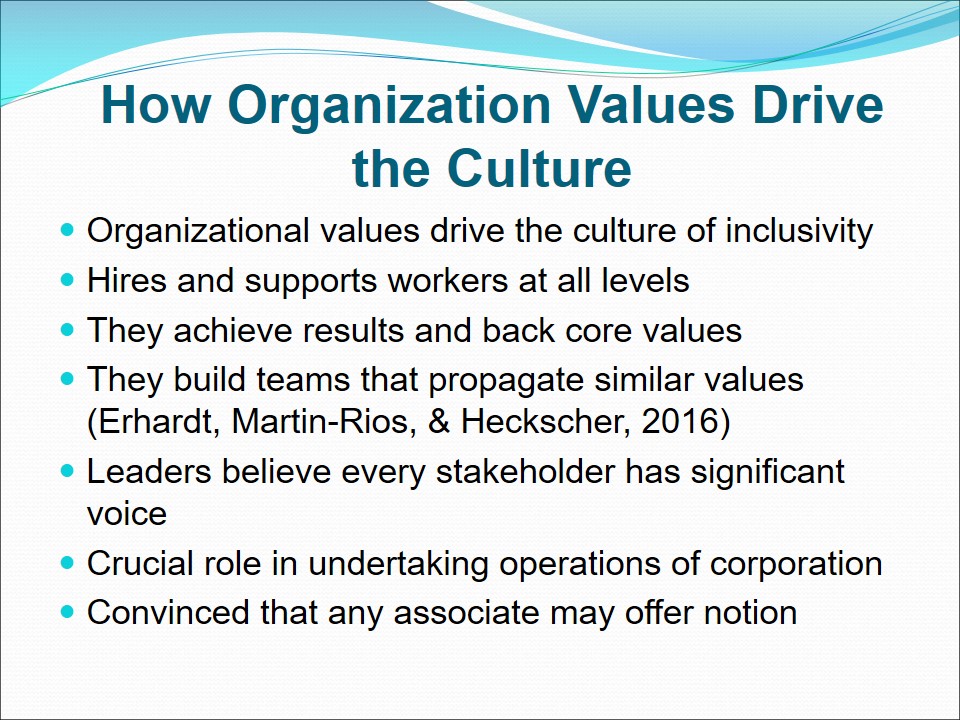
Culture that Exists
- Culture that exists in Walmart be reinforced.
- Respect for all ought to be strengthened.
- Uphold ethics and workforce diversity with expansion.
- Every stakeholder in corporation observe this culture.
- Executive ensure that they are always available.
- They should listen to concerns of workers (Galpin, Whittington, & Bell, 2015).
- All workers illuminate this culture with sincerity.
- Propagate the culture of respect for all.
- Management and employees greet customers with warmth.
- Surrounding communities will also reap the gains (Hock, Clauss, & Schulz, 2016).
- Healthy organizational culture has been of motivation.
- Employees are stimulated to give the best.
- Globalization and market expansion instilling the culture.
- Demands effective leadership and sound decision-making processes.
The culture that exists in Walmart and that should be reinforced is respect for all. This culture should be strengthened to uphold ethics and workforce diversity as the company expands its market. Every stakeholder in the corporation should observe this culture with the executive ensuring that they are at all times available to listen to the concerns of the workers and apply the open door policy when necessary (Galpin et al., 2015). All workers should also illuminate this culture with sincerity for the continued success of the organization.
To propagate the culture of respect for all, the management and employees of Walmart should greet the customers with warmth and reverence as they get into or leave any of the company’s stores. The surrounding communities will also reap the gains through outreach programs and corporate social responsibility (Hock et al., 2016). The healthy organizational culture has been of great motivation for workers. As employees work for the organization, they are stimulated to give the best of their abilities. With globalization and market expansion, instilling the culture to a vast number of people demands effective leadership and sound decision-making processes.
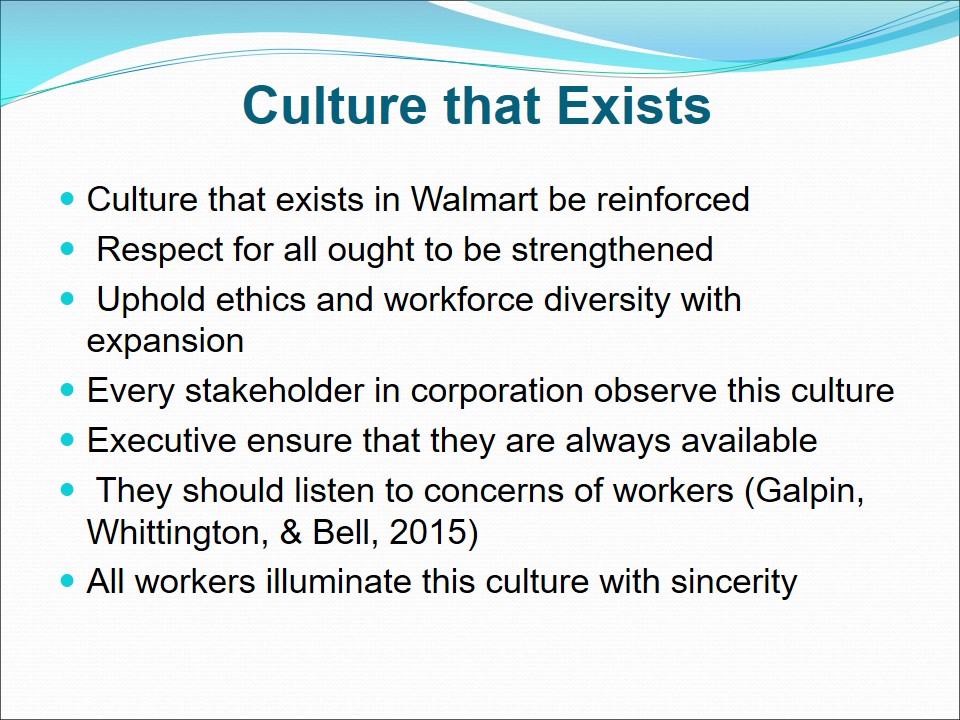
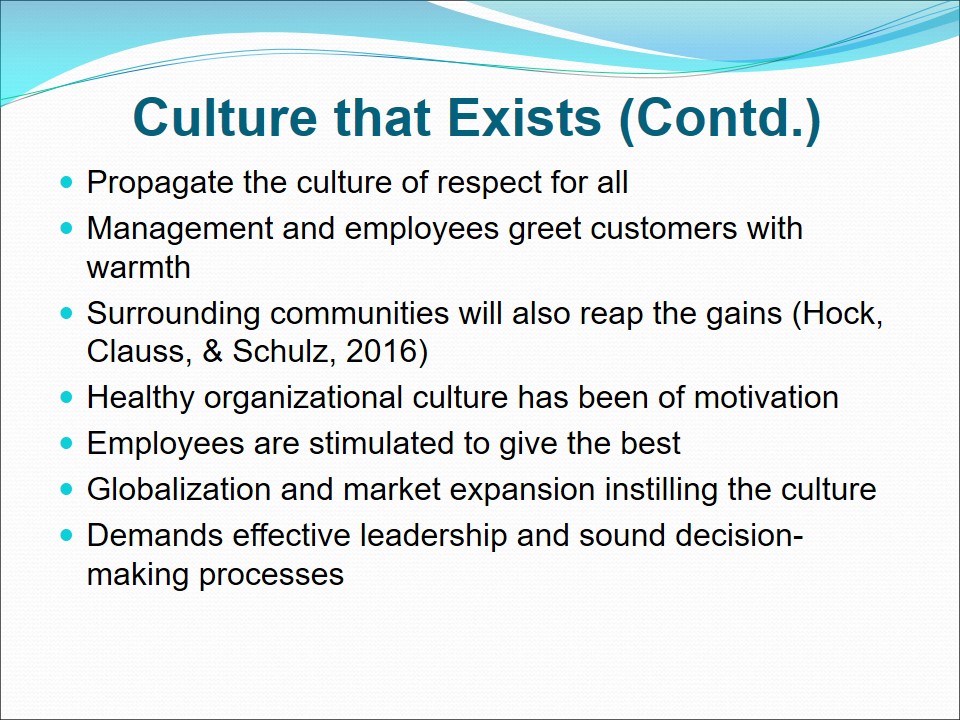
Competitive Advantage
- Competitive benefit is low costs of products.
- Low cost of the products has advantages.
- Expenses incurred in sales promotions reduced greatly (Schuetz, 2015).
- Customers get attracted to the company’s products.
- Are both cheap and of high quality.
- Walmart strongly values the system of cross-docking.
- System made company realize economies of scale.
The competitive benefit of Walmart is the low costs of its products compared to those of its competitors. The advantage of the low cost of the products is that expenses that could have otherwise been incurred in sales promotions are reduced greatly (Schuetz, 2015). Moreover, customers get attracted to the company’s products since they are both cheap and of high quality. Walmart strongly values the system of cross-docking. The system has made the company realize economies of scale thus bringing about significant decreases in the costs incurred.
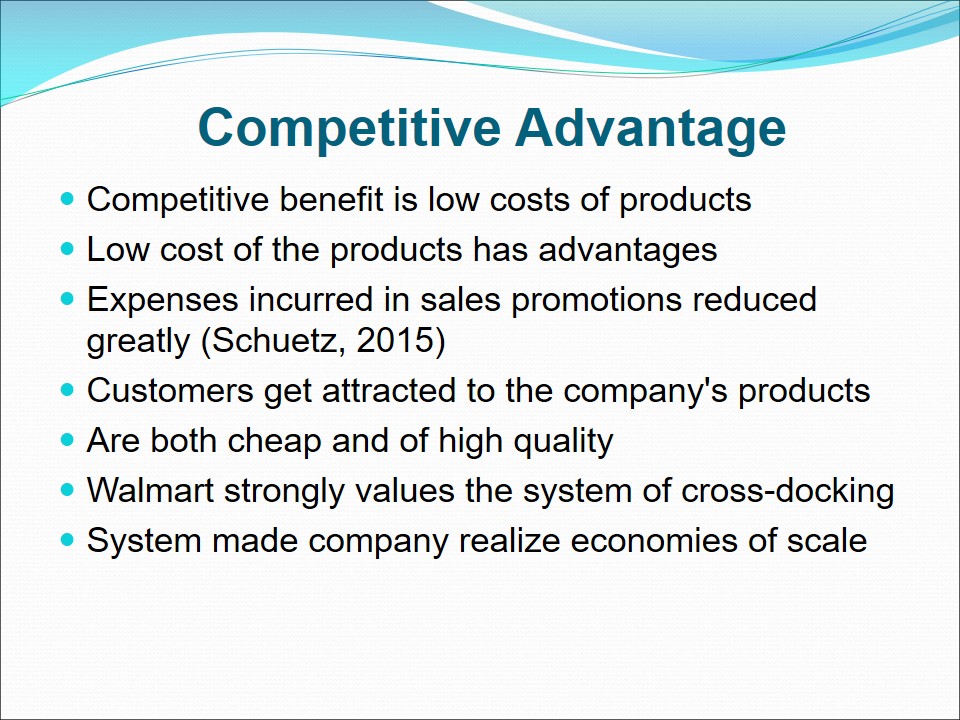
Conclusion
- Walmart embarking on market expansion to countries.
- Working hard to maintain the competitive advantage.
- It treasures the contributions of every employee.
- The impact of globalization and market expansion.
- Requires effective leadership and sound decision-making practices.
- Competitive advantage in low costs of products.
- Organization intensely values the system of cross-docking.
Walmart is embarking on market expansion to other countries and working hard to maintain the competitive advantage. It treasures the contributions of every employee for the continued success of its operations. Attributable to the impact of globalization and market expansion, the inculcation of organizational culture to a huge number of people requires effective leadership and sound decision-making practices. The competitive advantage of Walmart lies in the low costs of its products than those of its competitors. Moreover, the organization intensely values the system of cross-docking.
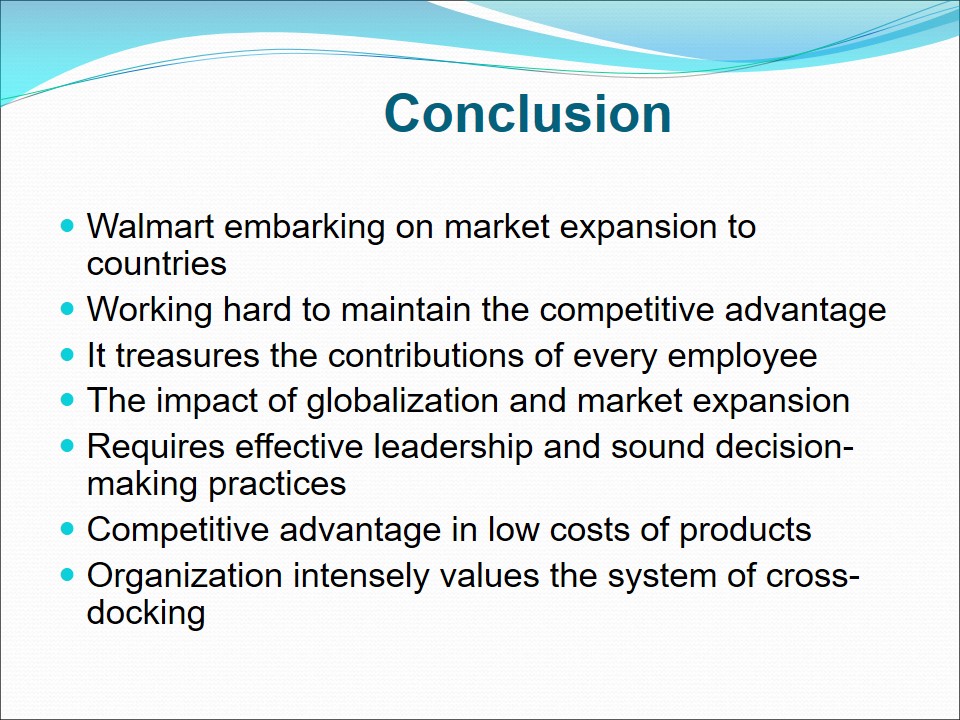
References
Erhardt, N., Martin-Rios, C., & Heckscher, C. (2016). Am I doing the right thing? Unpacking workplace rituals as mechanisms for strong organizational culture. International Journal of Hospitality Management, 59, 31-41.
Galpin, T., Whittington, J. L., & Bell, G. (2015). Is your sustainability strategy sustainable? Creating a culture of sustainability. Corporate Governance, 15(1), 1-17.
Hock, M., Clauss, T., & Schulz, E. (2016). The impact of organizational culture on a firm’s capability to innovate the business model. R&D Management, 46(3), 433-450.
Hunt, I., Watts, A., & Bryant, S. K. (2018). Walmart’s international expansion: Successes and miscalculations. Journal of Business Strategy, 39(2), 22-29.
Schuetz, J. (2015). Why are Walmart and Target next-door neighbors? Regional Science and Urban Economics, 54, 38-48.